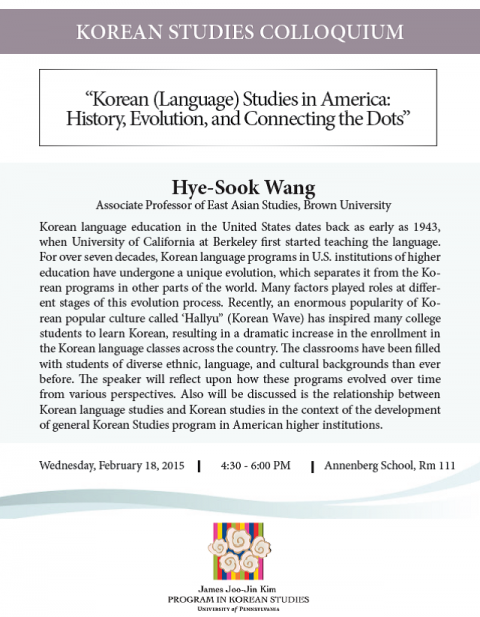
Korean Studies Colloquium
Annenberg School, Room 111
Hye-Sook Wang, Associate Professor of East Asian Studies, Chair of East Asian Studies at Brown University
Korean language education in the United States dates back as early as 1943, when University of California at Berkeley first started teaching the language. For over seven decades, Korean language programs in U.S. institutions of higher education have undergone a unique evolution, which separates it from the Korean programs in other parts of the world. Many factors played roles at different stages of this evolution process. Recently, an enormous popularity of Korean popular culture called 'Hallyu" (Korean Wave) has inspired many college students to learn Korean, resulting in a dramatic increase in the enrollment in the Korean language classes across the country. The classrooms have been filled with students of diverse ethnic, language, and cultural backgrounds than ever before. The speaker will reflect upon how these programs evolved over time from various perspectives. Also will be discussed is the relationship between Korean language studies and Korean studies in the context of the development of general Korean Studies program in American higher institutions. Hye-Sook Wang is an associate professor and chair of the department of East Asian Studies at Brown University. She is the author of Generation Gap and Other Essays: Readings in Korean Culture 1 and Frog’s Tears and Other Stories: Readings in Korean Culture 2 (both by Cheng & Tsui), and co-author of Integrated Korean: High Advanced I & II (by University of Hawaii Press) and numerous articles. Her most recent edited book History and Evolution of Korean Programs in the U.S. is forthcoming in early 2015. She served as the 4th president of the American Association of Teachers of Korean (AATK) from 2003 to 2006, and as the editor of The Korean Language in America: Journal of the American Association of Teachers of Korean from 2005 to 2013.
 James Joo-Jin Kim Center for Korean Studies
James Joo-Jin Kim Center for Korean Studies